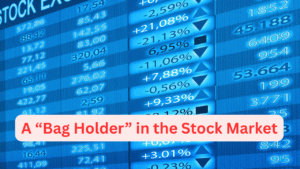 Understanding the Term “Bag Holder” in the Stock Market
Understanding the Term “Bag Holder” in the Stock Market
In the ever-volatile world of investing, some terms are as colorful as they are cautionary. One such term is bag holder. Though it may sound harmless or even humorous, being a bag holder in the stock market is far from a desirable position. This article explores the meaning of “bag holder,” how investors end up in this situation, its psychological underpinnings, and ways to avoid becoming one.
What Is a Bag Holder?
In stock market terminology, a bag holder is an investor who continues to hold a security that has plummeted in value, hoping it will rebound—even when the fundamentals suggest otherwise. The name is derived from the old expression “left holding the bag,” which refers to someone stuck with something worthless after others have bailed out. In essence, a bag holder is the last person still invested in a failing or failed asset.
This term is often used pejoratively to describe retail investors who, driven by emotion or misinformation, hold on to losing positions far longer than is financially prudent.
A Real-World Example
Imagine a company’s stock is trading at $100 per share. Excited by hype, social media, or news of a potential breakthrough, retail investors pour in. The price soars to $150. However, institutional investors, knowing the fundamentals don’t support the price, quietly start selling. Eventually, the hype fades, disappointing earnings are announced, or the news turns out to be misleading. The stock drops to $60, then $30, and finally to $5. Many early investors sell at various points, but a handful of people hold on, convinced it will bounce back. Those people—still clinging to hope while the stock becomes nearly worthless—are the bag holders.
How Do Investors Become Bag Holders?
- FOMO and Hype: Fear of missing out can lead investors to jump into a stock at its peak, often fueled by media attention, Reddit forums, or influencer promotion. They buy high without adequate research.
- Lack of Due Diligence: Buying a stock without understanding the company’s financial health, competitive position, or industry outlook is a recipe for trouble. Many bag holders buy on gut feeling or tips rather than solid analysis.
- Emotional Attachment: Investors may become emotionally tied to a stock, especially if it once performed well or if they believe in the company’s mission. This emotional bias clouds judgment.
- Refusal to Cut Losses: The desire to “get back to even” can keep investors from selling. They fear realizing a loss, which leads to the classic investing mistake: riding losers and selling winners.
- Confirmation Bias: Bag holders often seek out information that supports their belief the stock will rebound, ignoring warning signs or contrary evidence.
Psychological Factors at Play
Being a bag holder is not just a financial issue—it’s a psychological trap. Several cognitive biases contribute to the behavior:
- Loss Aversion: Psychologically, the pain of losing money is twice as intense as the joy of gaining it. This makes it hard for investors to accept losses and move on.
- Sunk Cost Fallacy: Investors may think, “I’ve already put so much into this stock—I can’t sell now.” They irrationally base their decisions on past investments instead of future potential.
- Hope and Denial: Hope can be powerful, but in investing, it can be dangerous. Bag holders often deny the reality of their situation, waiting for a miracle recovery.
How to Avoid Becoming a Bag Holder
- Have an Exit Strategy: Before you buy, decide on both your profit target and your stop-loss point. If the stock hits your loss limit, sell—no exceptions.
- Do Your Research: Base your investments on solid financial analysis, industry trends, and long-term growth potential, not hype or hot tips.
- Diversify: Don’t put all your capital into a single stock. Spreading risk across multiple assets can limit the damage if one investment goes south.
- Detach Emotionally: Treat investing like a business decision. Avoid getting emotionally attached to any particular stock or company.
- Review Regularly: Periodically assess your portfolio. Ask yourself: Would I buy this stock again today at its current price? If the answer is no, it may be time to sell.
Are Bag Holders Always Wrong?
Interestingly, not every bag holder ends up with worthless stock. Sometimes, a deeply undervalued stock recovers years later due to a turnaround or broader market conditions. However, this is rare and not a reliable strategy. Hope is not an investment plan.
Occasionally, the term “bag holder” has even been co-opted by some long-term value investors to describe their positions in distressed stocks, with the tongue-in-cheek belief that patience will pay off. But these are calculated risks taken with full awareness—not the blind hope of uninformed retail investors.
Final Thoughts
The bag holder serves as a cautionary tale in the world of investing—a reminder of the dangers of speculation, emotional investing, and ignoring market signals. While every investor will inevitably face losses, the goal is to learn from them and avoid holding the bag for too long.
In the stock market, timing and temperament are often more important than intelligence. Understanding when to walk away from a losing position can be the difference between a temporary setback and a catastrophic loss.
